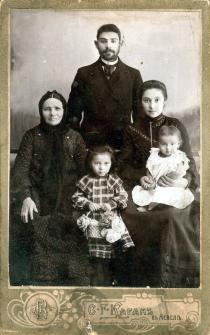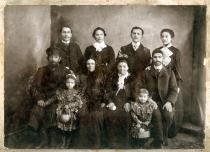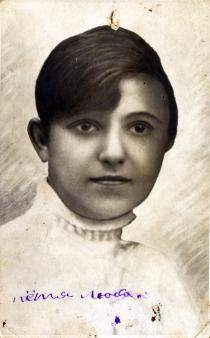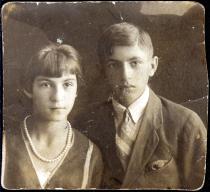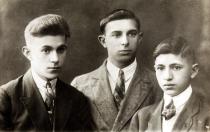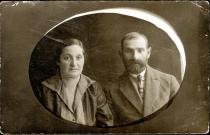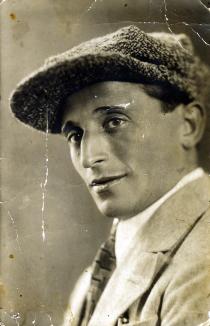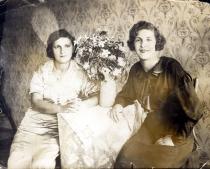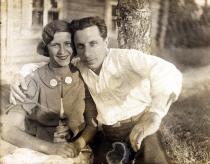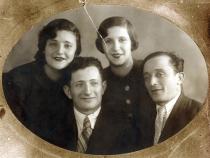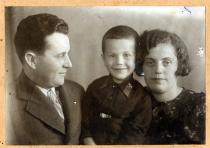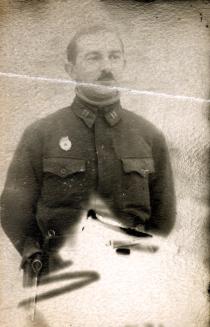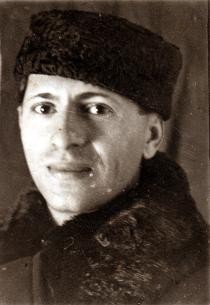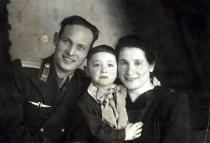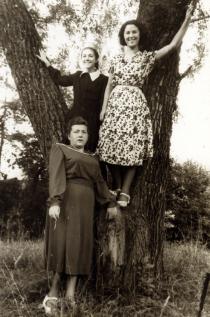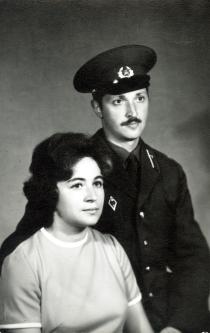
My name is Serafima Nakhimovna Staroselskaya, I was born in Leningrad in 1949. I know about my grandparents from what my parents told me, since I was born after the war and the older generation was eliminated, shot by the Germans. I keep that in mind all my life because it is very important to me.
My grandfather’s name on my mother’s side was Borukh Vigdergaus, and my grandmother’s name was Sima. They lived in the town of Nevel in Pskov province, where a lot of Jews lived. All our kinsfolk came from Nevel and Vitebsk. They were a very united family. Grandfather and grandmother were born approximately in the 1878-1880s. Grandfather's mother (my great grandmother) lived together with them, though she also had sons Grigory, Bentsion and daughter Manya. But grandmother loved Sima very much and said that she wanted to live only with her. Great grandmother was religious; she thoroughly observed all religious rules and the family celebrated Sabbath.
My grandfather’s brothers, Grigory and Bentsion, left Nevel for Leningrad in the 1920s. Grigory got married here, his wife’s name was Lisa. When other young relatives started to come to Leningrad, uncle Grisha and aunt Lisa’s house was always open for them, they were welcomed as if it were their home. They lived in the center of the city not far from the Technological Institute. Aunt always kept a bucket-sized pan on the stove, young people came to visit them very often. It was in the 1930s, when everyone was always hungry. As soon as one ate, others came, aunt Lisa poured some water into the pan, so that it was always possible to get a plate of soup in her house.
Grandma Sima was very kind and sympathetic, everybody loved her. She was a person easy to get along with. They owned an inn. There were a lot of villages around Nevel and Russian peasants, who brought foodstuffs for sales, stayed at my grandparents’ inn. As far as I know, they had no education, though outwardly they were very intelligent people. Grandma and grandpa had six children. They had seven children, but the first girl died. Three sons and three daughters remained. Elder daughter Sarah-Dinah (they called her Sonya at home), was born in 1901. Second daughter Lyuba was born in 1903. Then brother Semyon (Shlyoma) was born and later Yakov (Yankel) and finally Yefim (Khaim). Last and the youngest was my mom.
Their house was located right on the lakeside of the Nevel Lake. There was a lot of fish in the lake and many years later when we ate fish mom always said: “Now we can only recall the fish we ate in Nevel.” They fished themselves and sometimes fishermen brought the fish to us. Children had fun boating not only in boats but also in wash-tubs out on the water. Boys certainly were very naughty. Though there was a huge fruit garden of their own, they stole apples in neighboring gardens. The house was rather big, the family lived moderately but the children were always full. They kept two cows and lived owing to their own work. All Jewish traditions were observed by the family: grandma wore a traditional Orthodox wig, Sabbath was strictly observed, there were special Sabbath candlesticks and kosher utensils and mom remembered it all. Matzah was always baked for Pesach.
There were a lot of Jewish houses in Nevel and they were all very different. Mom told me that, unfortunately, many of the houses were dirty and slovenly. Grandma’s house was always very clean and full of flowers. Grandma Soma always dressed very neatly and nicely and differed from the others. That’s why there even appeared an expression “Sima and her kids.” Grandma never yelled at them. She never had anyone to help her with the house and managed everything on her own. All children started to walk barefoot as soon as spring came, sparing their shoes. Festive shoes were worn only on Pesach. Synagogue was attended obligatorily. A certain number of men gathered for a prayer in the houses. All in all, they led their own Jewish township life. My mother spoke Yiddish since childhood, it was her mother tongue and everybody at home spoke Yiddish.
My mother was born in 1915. She has a very interesting name – Kisya. She was given this name in honor of uncle Kushi. The name is a rare one, really. At those times parents gave their kids Jewish names as they wished. However, when mother obtained her passport during the Soviet time, she was told that there cannot be such a name. They offered her to change her name, to become Kseniya or Yekaterina, but mother insisted that her name remained as her parents had given her. Later since mother was a Comsomol member and worked with difficult-to-bring-up kids, she was called Katya or Ksenya, but basically she lived with the name Kisya, Kisulya.
When mother was a little girl, her elder brothers and sisters began to leave home. They began to move to Leningrad in the 1920s, as a lot of Jews who lived beyond the “Jewish Pale of Settlement” before the Revolution had done. Mother lived in Nevel up to 1930. She finished a Russian school there and was the last to leave among the other kids. She was 15 years old at that time. Older sisters already had babies and mom’s nephews were 10 years younger then herself. She even nursed them, because they were always brought for summer to Nevel to stay with grandparents. Only in winter, when everyone left for Leningrad, mother remained alone with her parents.
Her elder sister Soya (Sarah-Dinah) studied to become a seamstress at the age of 13. She sewed women’s lingerie beautifully. It was before the Revolution. Then she left for Leningrad and studied somewhere else. But no one managed to get a higher education. She got married in Leningrad, her husband was a military man and later on he worked at a printing-house till the end of his life. Second sister Lyuba got married at the age of 19. Her husband’s last name was Dernovsky, he also came from Nevel. He was the only person in the family who obtained a higher education. He studied at the Technological Institute in Leningrad, at the department of ceramics and refractories. It was such a starvation year - 1921 and Mikhail attended the Institute wearing only one rubber boot. When he graduated from the Technological Institute, he was assigned to work in the town of Borovichi, where aunt Lyuba and uncle Misha always lived. A large refractory combine was being constructed there and uncle held an important position at the combine. In general it was a family known to the whole town. They had five kids born.
Mother’s brother Semyon (Shlyoma) finished the Red Commissars’ courses. There was also brother Yakov. He perished on the Leningrad front line; other brothers also participated in the war there. Yakov was the only one who perished. He left two daughters who were born before the war, Galya and Edith.
Mother’s brother Yefim, born in 1912, served in the navy on a man-of-war. Once in 1937 during the massiveStalinist repressions, he mentioned in one of the conversations that people get orders like badges. Someone denunciated him and he was put into prison. All his family was, at it was called in those days, “incapacitated” and mother became a relative of the “national enemy,” but she never told about this at the place of her work. Later someone noticed her visiting the prison carrying parcels and informed the proper officials. Yefim stayed at Kolyma during the whole war. He got acquainted with a Russian girl, who came there with a Comsomol authorization, and a baby was born to them. They were allowed to leave Kolyma for Borovichi which was incredibly far away, since they were permitted to live only beyond “the 101st kilometer” [1946], and his elder sister Lyuba with her husband lived in Borovichi.
As I already mentioned, mother came to Leningrad in 1930 at the age of 15. It was the most difficult year - dreadful unemployment, so she had to visit the labor registry office all the time. Finally she managed to find a job at the technical school. She worked with machines: with a lathe and a metal machine, she also knew electricity well. She was rather crafty, all in all, besides, she sewed and cooked very well.
One of the brothers had a room on Nevsky prospect, in building # 1, with windows facing the Palace Square. All relatives and friends who came to Leningrad from the provinces, stayed in this room. All mom’s brothers and cousins were very amicable and visited the place very often. Mother lived also with her elder sister for some time. It was a Soviet-custom-type life. When mom came from Nevel, her Comsomol life period started. However, she spoke Yiddish in her midst. She was seriously in love with a Russian young man, but she parted with him, because she had been brought up believing that she should marry only a Jew.
My maternal grandmother died at the age of 43 of cancer. Before the war grandpa got married for the second time. The pre-war time was very difficult, but mom and dad recalled that all relatives were on friendly terms with each other. Bonds between relatives were different from that of contemporary. First of all, even a cousin was considered a very close relative and they helped each other. Mother was great friends with her cousin, Benstion’s daughter, her name was Rosalia. They were of the same age and they had one party dress for two, so they had to go on dates in turn, though there were a lot of admirers. Relatives visited each other often. There were no telephones at that time, but they all lived in the center, never locked the doors, no matter if it was a working day or a holiday.
Mother married Naum Staroselsky (his name was registered in the passport as “Nakhimya”) when she was 22 years old, in 1937. Father’s ancestors came from the town of Gorodok in Belorussia. By the way, the name of Staroselsky derives not from the nationality but from a location. I read about it in a book. Both Russians and Jews could have such a last name. I know less about my father’s parents. I think they were a bit older than my mom’s parents, born approximately in 1870. I do not have any of their pictures. My paternal grandmother’s name was Nekhama, and grandfather’s name was Alter-Shmuil. Though father’s patronymic was indicated in his documents as Adolfovich. I do not know what kind of education they had. I only know that grandma Nekhama was very beautiful and active and grandpa was, as they say, henpecked. Grandma was very enterprising, she was engaged in commerce, though I do not know, what kind of. They were better provided for than my mom’s parents. They owed two houses in Gorodok before the Revolution, a small one and a bigger one. They also had 2 or 3 cows. Everybody in the family worked. However, they were even “dispossessed as kulaks” in the 1930s.
Father (born in 1907) worked since he was a small kid, as he was the only boy. He had 4 sisters. The elder Dora was born in 1905 and Sonya was born in 1912; there was also Ida, who was born in 1913 and died right after the war; Bronislava, born in 1915, is still alive. Unfortunately, I do not know much about this part of the family.
Father lived in Gorodok approximately up to 1928, because he had to help his parents. Later he moved to Leningrad. He had a room on Basseynaya (now Nekrasova) Street. There was a Jewish club nearby where a lot of young people gathered, so dad lived a Jewish life mostly owing to that. Jewish young people entertained themselves and relaxed there, it was not prohibited at those times-- yet. There was even a peculiar “meeting club.” Dad had a lot of friends. He was a very outgoing and cheerful person. He met mom in one such gathering. He was wounded in the war, lost his health, which had a significant effect on his temper. Mom very often recalled what kind of nature he had had before.
Before the war mother worked at a mechanical plant. Before 1943 she worked as a secretary in Smolny [Leningrad Communist Center] for two years. When Kirov (a high party functionary) was murdered, everybody was fired and she lost the job. My parents got married on November 7th, 1937. The wedding took place on December 5th, it was the holiday of Stalin’s Constitution Day. Dad wanted to present mom a golden ring, but she told him that Comsomol members do not wear golden rings. So dad gave her a golden watch, which I still keep. They did not have a Jewish engagement ceremony and wedding. A trip to Leningrad was not possible for mom’s parents, so it was difficult to reach our relatives, who lived 40 kilometers from Nevel (in Vitebsk), and they did not see each other for years. The wedding was a fairly typical civil one.
I am not sure what dad’s occupation before the war was; he was some type of an office worker. He had no higher education. He finished a Russian school in Gorodok, but he spoke Yiddish very well. Dad carried the spirit of Judaism throughout his life. I think that he was a dissident, according to contemporary understanding. Mother was 8 years younger than him and was brought up within the conditions of the Soviet power: she was a Comsomol member and accepted everything connected with this life. Deep in his soul Dad never accepted the Soviet power completely. He admitted some things, but the spirit of the past, the bourgeois spirit, lived within him all his life. We did not really understand it until later. When mother married him, her family did not have a friendly attitude toward him, regardless of the fact that he was a Jew. They were all brought up in the Comsomol-Communist and Soviet conditions, and it seemed to them that dad had a certain “bourgeois touch.” In half a year after mom and dad got married they moved from Nekrasova Street to 85 Sadovaya Street, into a huge communal apartment without any conveniences. In 1938 my sister Nina was born, she was given this name in honor of grandma Nekhama (on father’s side). Mom went to her parents, who lived in Nevel to give birth to Nina. I was born in Leningrad, at the maternity hospital #2, the most famous one in the city.
Every summer before the war mom and Nina went to visit my grandparents; actually, all the grandchildren gathered there for summer.
War caught them there. Mom decided to go to Leningrad. Grandparents said to her: “Leave Ninochka with us”. Mother hesitated for a long time, but finally took my sister away. Grandparents stayed in Nevel but later decided to leave. They had friends among peasants, who loved them very much and offered them a hiding place in case the Germans arrived. And they did really hide them for two years. I found out about it just recently. I thought that they were executed in Nevel at the beginning of the war. Later, they were either betrayed or someone told them that there were no Germans in Nevel anymore, so they returned back to the town and the Germans grabbed them. I know it happened on September 16th, 1943, because mom always lit a candle on September 16th in their memory. It was a massive execution of the Jews. Some Jews dug trenches, then they were shot and the rest of the Jews buried them. I found pictures of the execution in Nevel at the Hesed Center not long ago. It was a real shock for me to see this big picture of the monument at the place where my grandparents were executed. I only heard from mom before that the place was called the Blue Dacha (summerhouse).
Thus my sister was saved, as mother took her to Leningrad. When the war broke out, children were evacuated from the city with their kindergartens, separately from their parents. So mom sent Nina with the kindergarten. When she had left, mom understood what she had done and got frightened that she had sent a 3-year old child alone. So she left with the last special train to look for Nina, as she knew approximately where to look. She found her in the town of Nikopol. In September 1941 they were evacuated to the town of Belibey in Bashkiriya, not far from the town of Ufa, because two father’s sisters were evacuated there.
Mom told me a lot about evacuation. She left Leningrad together with her friend, who had two kids. They stayed together during the war. It was very difficult to find a place for living in Belibey, though finally they found a 5 meter poky little room, with hoarfrosted walls. Mom was lucky, because in evacuation she met a good friend of hers, who helped her to get a job at the officer’s canteen. So she always had food. They lived in evacuation until 1944.
My dad lived through two wars: the Finnish and the Great Patriotic wars. He was a volunteer at both wars. He served as a medical assistant having finished special courses. He was not even wounded during the Finnish war. Later he was at the Leningrad frontline and took part in military operations. I know that he save a lot of people, because even after the war people came to us and dad could not even remember them. They expressed their gratitude to him for saving their lives. In 1943 dad was wounded in his leg. He stayed for half a year in a hospital near Leningrad. The wound was very severe and they thought that the leg could not be saved. But they did save it, though he had to get about on crutches for a long time after. He managed to find mom in Belibey. She recalled the scene – when someone suddenly told her: “Kisya, go meet your one-legged!”
When the blockade was lifted, dad began to write to Leningrad and at the end of 1944 they received a permission to return. When mom and Nina came to Leningrad, the streets were totally deserted. Their room in Sadovaya Street was not occupied fortunately. But everything was stolen. Nobody really pondered on that, everybody was happy to be back home. Mom found a job of a passport office employee and worked there for several years.
All our men relatives participated in the war and the women remained in besieged Leningrad, some managed to get evacuated. Mom’s elder sister Sonya and many other relatives stayed in besieged Leningrad. They almost starved to death when dad returned from the frontline after he had been wounded. He found a dead horse on the way. He managed to get some horse-flesh and brought that meat to his relatives who lived on Fontanka embankment, when they already could not move and lay motionless. There were five of them. Finally they had something to eat. They recalled this story with gratitude all their lives, because dad saved their lives.
Two years after the war ended, in 1947, when dad was in a bad condition after being wounded and had to get about on crutches, he went to get some milk, one tram stop away. He brushed against a woman with his crutch, she called him a “Jewman”, and dad responded something. But the woman appeared to be a militia officer. He was immediately arrested, and dad spent 8 or 9 months in Kresty [Leningrad prison]. It was very difficult to get a permit for him to stay in Leningrad, it became possible only owing to his many orders and war wound. There was a criminal case brought against him, but he was acquitted. It is possible to talk about repressions today. But at that time everything was concealed, so I found out about that case only when I was a grownup. It was a real shock for me. A man, who had done so much for people, who participated in the war! After that dad’s health was undermined. And all this happened because he could not keep silent when he was called a “jewman”.
I was born in 1949. I do not remember either my mother or my father young. When I was born, mom was 34 years old, but she really looked rather youthful. Dad was 42. He was very sick after the war wound and his temper changed a lot after the ordeals he survived, he became more reserved and suspicious. I got my name in honor of grandma. When mom registered me, she wanted the name to be written “Sima” in the birth certificate, but she was told that there was no such name and they wrote “Serafima”. I had a lot of cousins, but I was the only one, who resembled our grandma both by appearance and by temper. I also love flowers as much as she did.
Jewish spirit was always present in our family and I understood since childhood that I was Jewish. I had a lot of friends who were Jews only by passports, some even concealed their nationality.
My childhood was hallowed by Jewish holidays and attendance of the synagogue. It was before school. I remember our neighbor Masha, who was a year older than me. We attended the synagogue together with our fathers and not only for praying. It was a place for Jews to meet in Leningrad. Lermontovsky prospect, where the synagogue was situated, was overcrowded on holidays. This synagogue is located in the center of the city and holds more than 2,000 people. Old friends met there. I remember dad, mom and me walked from one group to another, say hello, and our friends always paid attention to how children were growing up. Father always prepared to such visits very solemnly, put on his best suit and a broad brimmed hat. They spoke mostly Yiddish at synagogue. We celebrated Jewish holidays at home but did not observe Jewish traditions thoroughly. Though mom always said that meat should not be mixed with dairy products. So we did not, though not because it was not allowed to, but simply because that was the way it used to be in our family.
I have been to the synagogue recently after the restoration of the building. Everything turned over in my soul when I remembered how the cantor sang when I sat there. I imagined dad and all our friends because the synagogue was never a mere empty phrase for me. When I hear songs in Hebrew, but especially in Yiddish, the “voice of the ancestors,” something stirs inside me, and though I never knew my grandparents, I have a feeling that I see them in front of me.
I attended the synagogue as a student and never missed a holiday. Simkhat-Torah was the most cheerful holiday. It is a very merry holiday with dancing and singing. Regardless of something happening around us all the time, like someone was expelled from the Institute, someone was arrested, I was not scared and continued attending synagogue. After synagogue services we continued having fun at somebody’s apartment. It was the end of the 1960s, beginning of the 1970s, the time which was later called the end of “Khruschtchev’s thaw” [ the beginning of liberal reforms in the Soviet Union ]
The district where we lived was very international. There were 9 apartments in our house but there was no apartment where a Jew did not live. For instance, our “communalka” had 7 rooms and 3 Jewish families lived in it. People came and went, but there were always at least 2-3 Jewish families. Tatars lived here as well as gypsies. Anti-Semitism was invisibly present, but we, children, always understood each other and played together. Since a lot of Jews lived in Sadovaya Street, people spoke Yiddish very loudly in the street, without any embarrassment. It remained like until the 1960s. Later we began to feel nationalism and anti-Semitism. No one taught me this language, so I knew only some words, which I heard often. My parents spoke Russian with me, but when they wanted to conceal something, they proceeded in Yiddish. Some words I understood, some not. Though my sister understood Yiddish better than me because she learnt German at school.
There lived a very religious Jewish family in our house, the Golimbevich family. Mendel, the representative of the elder generation, never worked, except at the synagogue. This family always observed Sabbath and all holidays. They had a boy, Izya (Isaac), we were of the same age and were in the same class. He and Mendel wore kipas at home. He was the only one who did not go to school on Saturdays. Teachers were slightly displeased with that, but they finally accepted it, as he was a rather clever boy and studied well, so this did not influence his education. A rabbi visited him at home and he studied the Torah.
It was 1954-1955 and since we were friends, I came to their place often and saw him pray. I remember it very well, though I did not understand everything correctly. They invited me on some holidays, we celebrated Hanukah together, lit the candles and everything was the way it should be. Mendel had 3 daughters, one of them managed to leave to Palestine in 1930 and two other daughters tried to cross the border when the Israel state was established. They were caught and put into prison. One of them had a son named Izya. He remained with his grandparents who brought him up. In 1956 when we were in the 1st grade, his mother and aunt were released from prison. Izya and I were walking home from school and suddenly he rushed up to one of the women crying: “Mom!” I cannot imagine how he recognized her; he hadn’t seen her since he was very small. This family lives now in Israel..
Certainly I faced anti-Semitism in my life and not just once. I remember when at school my classmates peeked at the end of the class register and asked me: “What kind of patronymic you’ve got – Nakhimovna?” I was always busy with public tasks, I was a pioneer and later a Comsomol member. I also remember how in the 8th grade children were chosen to be sent to Artek [famous international pioneer’s camp on the Black Sea]. I was one of the first candidates to go. I was summoned to some commission and asked who my parents were by nationality. I answered that they were Jews. So another girl instead of me went to Artek, who never carried out any public work. It was like a first slap on the forehead for me, and a very unpleasant one.
Then there was another case. School children from Leningrad were authorized to go to the XXII Party Congress to welcome the Congress delegates. It was a tradition at that time. Only six children could go. The pioneer leader of our school, Lyudmila Valentinovna, was to supervise our delegation. She was half-Jew on her mother’s side. Neither me, nor she, were allowed to go to Moscow. Others went instead of us. I do not think I could have hindered someone from something at the Congress, it was absolutely clear that my Jewish origin was the problem. Almost the same happened when our group at the Institute went to Bulgaria. Without me. When I worked at the scientific enterprise and a group of employees was going to Poland, I “reached the district party committee (raykom)” and the commission asked me a question, which had nothing to do with Poland. Everybody was allowed to go and I was told: “Go and prepare yourself”. All in all, there were such moments, and not just a few.
I finished school with a silver medal and entered the Leningrad Technological Institute to obtain a profession of a chemist-technologist. After graduating I worked for 15 years at a Scientific Research Institute; later for 14 years at an environmental preservation laboratory. Being a final-year student in 1971 I had the right to choose the place of my future job, since I was second in the class. However, when before the assignment we were all collected together, our teacher warned us that it was no use to get a job at GIPKH (State Institute of Applied Chemistry) (this warning was meant for the Jews, and there were a lot in our group). Starting from 1972 Jews were not accepted to the scientific Research Institute of Synthetic Rubber, where I was assigned to after graduation.
I met my husband Mikhail Isaacovich in 1970, when I went with my friend to Seliger Lake for winter holidays. My husband-to-be also went there with his sister. We liked each other at first sight. We talked on the phone for a year and a half, then began to go out and married in 1972. Soon after that my husband was enlisted to the army. Nelya was born in 1975.
My husband’s father, Isaac Markovich Lokshin, was a military man and their family had to move constantly from one place to another. Only in 1975 they “settled” in Leningrad. That is why they were less used to Jewish life. My husband did not attend the synagogue like I did when he was young because he could have been fired for that. After graduating from the Aircraft Equipment Construction College he worked at a secret “Vector” enterprise. However, my husband still speaks Yiddish. He graduated from LIAP (Leningrad Aircraft Equipment Construction Institute) by correspondence and continued to work at the same Institute. For the last 10 years, since 1994, my husband has been working in St.Petersburg Department of the “Joint” organization (an American Jewish social welfare organization).
My husband’s grandfather’s name was Zalman Khenkin (he came from Tula). He left for Palestine in 1919. He left his wife and two children in Russia. My husband’s mother, Nekhama-Maryasya Khenkina (my mother-in-law) was not born yet at that time: grandma of my husband was pregnant with her third child, when grandfather left. He left the town of Yefremov near Moscow, there were pogroms, and their family was rich, they owned a jewelry store and Zalman permanently felt potential danger. He left for Palestine hoping that he would be able to settle and send for his family. At first the family kept in touch with him, he wrote letters. But in 1921-1922 the contact was interrupted. Zalman disappeared. No one knows what happened, but it was assumed that some relative, my husband’s grandmother did not want their daughter to leave forever, and interrupted the contact.
My mother-in-law, Nekhama-Maryasya (Lokshina after marriage) grew up without her father, but grandfather’s sister, her aunt, told her a lot about him. He was a very interesting person, a very musical one, he could even play the saw. He was very kind. He loved his wife (mother of my mother-in-law) very much. First 10 years of my married life I was sure that mother-in-law knew her father, as she spoke so much of him. They also led a Jewish life at home. But at the age of 12 she left [interviewer does not know where]. Her parents were also executed during the war in Belarus. She remained without any livelihood. After the war she lived in Leningrad and finished a technical school here. None of her relatives are alive. She got married after the war.
It was possible to find out about Nekhama-Maryasya’s father’s fate at the beginning of the 1990s, when our daughter Nelya got engaged in Jewish life of the city and began to meet representatives of Jewish youth, who visited Leningrad. I would like to tell about this in detail. When at the beginning of the 1980s a massive departure to Israel started and fewer and fewer Jews remained here, we began to think, what could we do to bring our daughter into a Jewish environment? We never hid our Jewish identity from our daughter (although there were a few friends we never told). I even know families where the children did not even know what their nationality was. So we registered our daughter with the Sunday school at the synagogue. Nelya plunged into Jewish life and made a lot of new friends there. She asked one of them, Avraam, to try and find out something about grandfather’s fate in Israel. When he came home, he placed an announcement in a newspaper, seeking Zalman Khenkin, who had left in the 1920s from the town of Yefremov, Moscow region. And one wonderful evening the phone rang in our apartment. I only understood that the person spoke Hebrew and wanted to talk to Nelya. She was not at home. In a day there was another call and a woman said that she had seen an announcement saying that relatives are looking for Zalman Khenkin. “We are Khenikin, maybe my father was your relative?” She told that her father had died in 1967 and she kept his pictures. In order to find out if it was correct, we sent a picture, which grandmother kept, to Israel.
All in all, it appeared so, that Zalman Khenkin’s trip to Palestine was very long, he was even in Turkish captivity. When he settled in Palestine and his contact with his family was absolutely lost, he got married in 1930 and created a new family. He had two children, son Iser and daughter Shoshana, the woman who called us. We invited Shoshana and her brother to visit us in 1993. In order to meet guests from Israel, the sister of my mother-in-law came from Astrakhan, her name is Irina (they called her Fira at home). She and Shoshana were very much alike. A lot common memories popped up when they looked at their old pictures. Shoshana remembered how her father sometimes took out a casket, where he must have kept letters and pictures, then locked himself in the room and examined them for a long time. When Zalman died, the casket disappeared. Shoshana told us that they had all known about some secret in their father’s life, but he had never told anyone about it. He never even mentioned that there was a family of his left in Russia. She also told us that she had a feeling since childhood that she had a sister somewhere in this world. So it was: she had a stepsister! They both were very happy. Very often relatives now manage to find each other. But at that time, 10 years ago, it was a sensational story! We were all shocked, as well as our friends and our relatives from Israel. Such a big family we have. Both Nelya and grandmother are great friends with Shoshana, and she calls us often. My mother-in-law visited Israel 3 or 4 times.
I would like to add a couple of words about my husband’s aunt Ira (Fira), whom I mentioned above. She was born in 1918. She lived near Moscow before the war, in the town of Pervomaysk. She got married at a very young age, when she was 16. When her husband left for the frontline, she remained alone with her children. Very soon she received a notification about her husband’s death. She was supposed to share the fate of all Jews in town. They were collected together, arranged in columns and led to execution. Germans and Romanians guarded the column. Fira was very beautiful and one of the Romanians liked her. He managed to save her by miracle, pretend that she was Russian (aunt used the name of her killed friend Ira Molchanova). Later when the Red Army forces released Pervomaysk, one of the soldiers, Sergey Levchenko, met Ira, fell in love with her and married her in spite of the three children she had. Then another baby was born. After the war Ira suddenly (when she was walking along the railroad lines) met her first husband! It turned out that the “death notification” was sent too soon - he was alive and looking for his family! So he had to resign himself and admit that the war and fatal circumstances separated him with Ira and the kids. He left for Odessa. Sergey brought up all kids and loved them all as if they were his own. Their family lived in Astrakhan and Ira worked there as an administrator in a theater. She is now 84 years old and lives with her son in Zhukovskoye near Moscow.
Now a little bit about my daughter, and how our family returned to its origins. As a child Nelya spent a lot of time with her grandmothers, she learned a lot from them and a lot passed between these generatons. However, our family never celebrated real Jewish holidays and Sabbath. But the revival of Jewish life and our junction with it commenced at the end of the 1980s. Very quickly and surprisingly for all of us she learnt Hebrew in synagogue so successfully that by the end of the 10th grade at school she began to give lessons to small kids in Sunday school. Apparently certain Jewish genes guided her toward the language. She wanted to be a teacher since childhood and planned to enter the college named after Nekrasov, where students are trained to be educational specialists for children of preschool age. She finished her courses there. Suddenly she was persuaded to go study in Israel. She left and for a year studied at the “Makhon Gold” religious pedagogical college. At that time she began to observe Jewish customs and traditions, to celebrate Sabbath and wear a long skirt. I supported her studies and was glad that she would know the traditions and the Jewish culture very well, though I was afraid a little bit that her religiousness would go too far, that she would become an Orthodox. This fortunately did not happen. Her studies were very interesting and she traveled all around the country within a year.
Having returned to St. Petersburg Nelya became a leader of “Bney Akiva”, one of the first Youth’s Jewish organizations in our city [1990]. At that time there were no permanent offices and they had to rent an apartment. She celebrated Sabbath there according to the proper rules and cooked food. It was a real official job and it was accounted for her as a year of alternative service in the Israel Army, “Shrut Leumi”. After that Nelya decided to leave for Israel for permanent residence. She entered a Pedagogical Institute in Jerusalem, but visited home every year. Finally she married her classmate, Boris Onoprienko, and in 1997 she came home after graduation and started to work at “Adain Lo,” a regional public Jewish organization, where she was very much needed, because Jewish kindergartens, which started to open at that time, had no educational specialists with Israeli certificates.
For the last three years, since 1999 and up to now, I also work as a coordinator of “Yakhat,” a program developed by “Adain Lo” for disabled children. I like the work I am doing now, very much, because disabled children are the category of the society which never really received proper attention in this country.
Sima Staroselskaya is a very active woman with perfect taste, which is proved by cozy home environment and atmosphere, where a lot reminds one of the family history and Jewish traditions (for instance, pictures of relatives, candlesticks and a mezuzah at the entrance to the apartment). Her family is a very vivid example of Jewish life revival in St.Petersburg: everyone in the family, including father, mother and daughter, work enthusiastically in the city’s Jewish organizations, not by word of mouth, but in actual deed assisting a lot of people, both children and adults to become aware of their belonging to the Jewish nationality.
